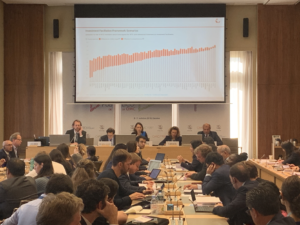
Axel Berger presented the new Investment Facilitation Index (IFI) at the Public Forum of the World Trade Organization (WTO) on 10 and 11 October 2019 in Geneva.
The index maps the adoption of investment facilitation measures at domestic level and serves as a basis for future research on the economic benefits and costs of an international framework for investment facilitation that is currently being discussed among WTO members. A key result of the IFI is that developing countries, which potentially benefit the most from investment facilitation reforms, face major challenges to implement international disciplines on investment facilitation.
Discussions at the WTO Public Forum made clear that further research and policy dialogue is needed to better align investment facilitation initiatives with the demands of sustainable developments and the 2030 Agenda.
 The G20 has been mired in an ongoing crisis for years. After the G20, newly formed ten years ago at the level of heads of state and government, initially overcame the economic and financial crisis more or less successfully, the question quickly arose as to its role beyond reacting to crisis. Instead of taking on a proactive role as a strategic steering committee for the global economy, driving reforms and ensuring the provision of global public goods (such as climate protection and free trade), the G20 proceeded to jump from one issue to the next. The fact that its presidency changes every year has contributed to this ‘issue hopping’.
The G20 has been mired in an ongoing crisis for years. After the G20, newly formed ten years ago at the level of heads of state and government, initially overcame the economic and financial crisis more or less successfully, the question quickly arose as to its role beyond reacting to crisis. Instead of taking on a proactive role as a strategic steering committee for the global economy, driving reforms and ensuring the provision of global public goods (such as climate protection and free trade), the G20 proceeded to jump from one issue to the next. The fact that its presidency changes every year has contributed to this ‘issue hopping’.
 For 2019, the global challenges are unlikely to become fewer than in 2018, based on the past experiences. The post-cold war international order as we knew it has taken a few blows again in 2018. Some key pillars and narratives are being shifted and challenge the stability of the international architecture. As often with foreign relations, it takes place in a context that consists of both global challenges and domestic priorities. Indicators for change will thus be located in domestic politics of some key countries. Without wanting to sound overly optimistic for a surely difficult year to come, some elements for a change are visible.
For 2019, the global challenges are unlikely to become fewer than in 2018, based on the past experiences. The post-cold war international order as we knew it has taken a few blows again in 2018. Some key pillars and narratives are being shifted and challenge the stability of the international architecture. As often with foreign relations, it takes place in a context that consists of both global challenges and domestic priorities. Indicators for change will thus be located in domestic politics of some key countries. Without wanting to sound overly optimistic for a surely difficult year to come, some elements for a change are visible.